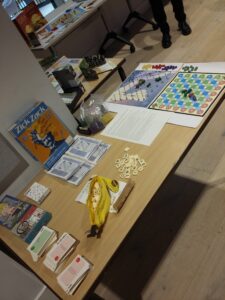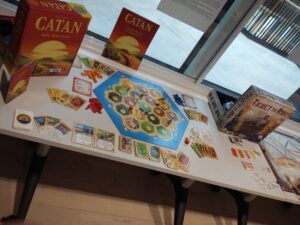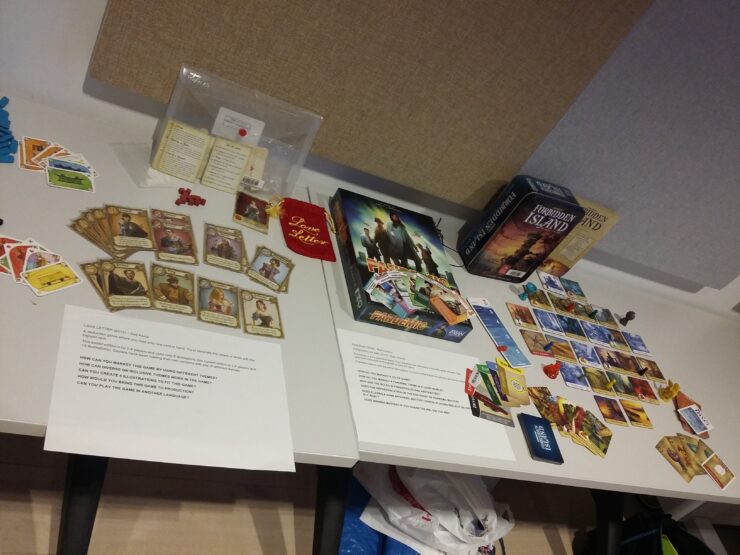By Library and Learning Services, York St John University.
If you had read only three books – A Christmas Carol, The London Phone Directory A-H, and Death On The Nile, would that be a good basis for educating others? They may be classics within their genres, but would knowing about three books and nothing more be sufficient for teaching a subject? If you knew of only three paintings or had watched only three films, would you be well enough informed on art or cinema related to your discipline?
Then, why do you know about only three boardgames: Monopoly, Scrabble and Cluedo?
For the Talk About Teaching Conference 2024 at York St John, our workshop showed off part of the library’s modern boardgame collection. Staff who attended sat down and played some of the games. Modern boardgame design has developed radically since the 1990s, and provides a wide range of opportunities for learning. Our collection features Eurogames, a modern design philosophy focused on positive, constructive gameplay, with simple rules but varied outcomes. These are not the games of your childhood, and nothing like games from the 1930s and ’40s.*
Eurogames are useful across many courses – e.g. Publishing, Illustration, Graphic Design, Marketing, Event Management, Linguistics, Primary and Secondary Education, and, of course, Game Design. The possibilities are huge, and our discussions at the workshop revealed some surprises.
For example, one visitor was looking at team-building for students on Nursing courses. Our co-operative games Forbidden Island and Pandemic are good for this, but we also explained how traitor games work. This brought up their need to discuss accusation and the ‘blame game’ in nursing. By playing a co-op game with a hidden traitor, a tutor can then lead a discussion about blame culture, letting students experience the behaviour in a controlled way and gain understanding.

Likewise, in playing the game Apples to Apples, where players make judgements on personal opinions, one player was having trouble with making a decision. Reflecting on this afterwards, colleagues concluded that having a student experience discomfort or failure in a safe environment lets them learn and grow in confidence. Apples to Apples involves speaking to a group, prompts decision making, considering other people’s values, language comprehension and elements of social studies (although it was an old copy, and it was questioned whether Chris Tarrant was still relevant today!).
Moreover, reflection is a typical action that takes place when we finish a modern game. What did you like or dislike about the game? In playing a game for just a few rounds, our visitors could see various ways they could use it in modules and coursework. Possibilities for modern boardgames to help students practice reflection skills ahead of assignments were also of interest to colleagues.
Modern boardgames is a mature multi-billion dollar industry, with annual growth and a widening market, especially across Asia. Employability modules could also utilise workshops based on modern boardgames. To give some brief examples:
- Linguistics – translation and localisation projects (Japanese to English, English to French, German, Spanish, Portuguese, Japanese or Korean), events coaching games for language activation, and ESL and BSL.
- Product Design, Marketing, Illustration, Graphic Design – cross-programme projects to design a modern game, or re-theme an existing design, produce and market it (modern games are licensed from game designers by publishers).
- Film, Performance, Writing, Education – creating How to Play videos for the library collection, thus helping people overcome barriers to play.
Please come and look at the games collection in the library. It is likely you have already played some of these modern games. We want to hear your suggestions and ideas about using this resource across campus. Please email our team at sia@yorksj.ac.uk, and let us help you discover life beyond Monopoly!

*e.g. Scrabble 1948; Cluedo 1949; Monopoly; 1935 (inspired by The Landlord’s Game, 1904.)
Further reading
Bayeck, R. Y. (2020) Examining board gameplay and learning: a multidisciplinary review of recent research. Simulation and Gaming 51(4), 411-431. https://doi.org/10.1177/1046878119901286
Mayer, B. & Harris, C. (2010) Libraries Got Game: Aligned Learning Through Modern Board Games. Chicago, IL: ALA Editions.
van Esch, C., & Wiggen, T. (2020) Can your students save the world? Utilizing Pandemic®, a cooperative board game, to teach management. Management Teaching Review 5(3), 275-283. https://doi.org/10.1177/2379298120933626
